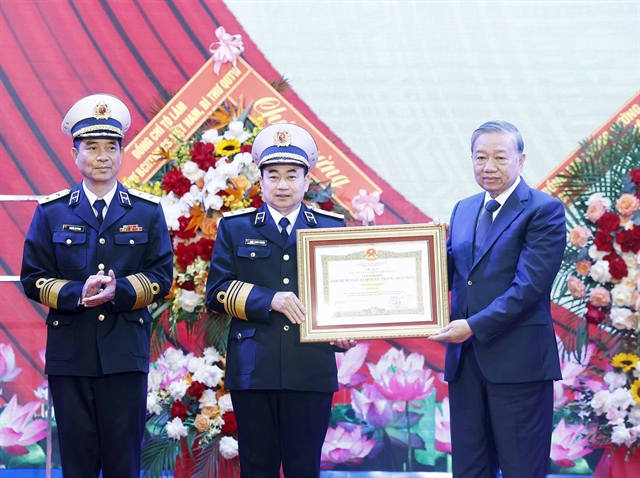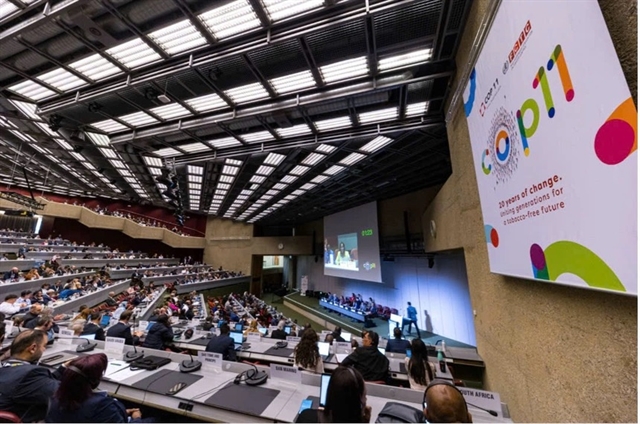 Society
Society

 |
| The opening of the 11th session of the Conference of the Parties to the WHO Framework Convention on Tobacco Control (COP11 – WHO FCTC) took place in Geneva on November 17. — Photo courtesy of WHO |
GENEVE — Việt Nam attended the opening of the 11th session of the Conference of the Parties to the WHO Framework Convention on Tobacco Control (COP11 – WHO FCTC) which took place in Geneva on November 17.
The event, which is participated by more than 1,400 delegates from 162 countries, is considered the world’s largest forum on tobacco control, taking place as new-generation nicotine products pose mounting challenges to public health.
The Vietnamese delegation, comprising 10 members representing the Ministry of Health, the Government Office, the National Assembly’s Committee for Culture and Society, the Ministry of Finance and others, is led by Dr. Hà Anh Đức, director of the Department of Medical Services Administration and director of the Fund for Tobacco Harm Prevention and Control.
At the high-level strategic dialogue held on the opening day, delegates reviewed two decades of implementing the WHO FCTC – the fastest-ratified public health treaty in United Nations history.
After nearly 20 years, many parties have significantly reduced smoking prevalence, expanded smoke-free areas, increased excise taxes and restricted advertising.
However, tobacco continues to cause more than seven million deaths annually, while the use of e-cigarettes, heated tobacco and other novel nicotine products has risen sharply, especially among young people.
Speaking at the opening ceremony, Andrew Black, Acting Head of the WHO FCTC Secretariat, said COP11 offers countries an opportunity to discuss measures for the future, including environmental protection from tobacco waste, strengthening legal accountability for violations and enhancing nicotine-addiction prevention.
He commended parties for their engagement and affirmed that the Secretariat will continue supporting countries in building capacity for treaty implementation.
For Việt Nam, COP11 carries particular significance as the country maintains its goal of reducing smoking prevalence and protecting young people from nicotine addiction.
Việt Nam ratified the Convention in 2004 and has since been recognised internationally for its progress in tobacco control.
The Law on Tobacco Harm Prevention and Control, adopted in 2012, established a comprehensive legal framework, from pictorial health warnings covering 50 per cent of packaging to the introduction of smoke-free public spaces.
Việt Nam also established the Tobacco Harm Prevention and Control Fund – a model praised by WHO – to support communication, training and strengthened inspection.
As new-generation tobacco products spread, Việt Nam advocates strict regulation and is considering stronger measures to limit youth access.
Products such as e-cigarettes and heated tobacco are considered addictive and potentially a gateway to traditional cigarette use, contradicting the “harm reduction” claims promoted by the industry.
This year, one of the most closely watched topics at the ministerial roundtable chaired by Belgium is the rising use of e-cigarettes and new-generation nicotine products among adolescents.
Delegates stressed that young people are heavily influenced by the online environment, where advertising, viral content and flavoured products make access easier.
A shared warning was issued: without strong and consistent action, the world risks creating a new generation addicted to nicotine.
The Global Progress Report 2025, released during the opening session, identified the three biggest barriers to effective implementation of the Convention: insufficient human resources, limited financial capacity and, most notably, strong interference from the tobacco industry in policymaking.
Many delegations noted that tobacco companies are actively promoting “harm reduction” narratives to delay regulation, despite scientific evidence showing that new products still contain addictive nicotine and carry significant health risks.
During its working sessions, COP11 discussed key issues including product ingredients and packaging; transparency requirements; strengthened legal liability; environmental protection from tobacco waste; measures to reduce consumption and nicotine addiction; and safeguarding public policy from tobacco-industry influence.
The conference theme – “Twenty years of change, connecting generations for a tobacco-free future” – highlights the global commitment to creating a healthier environment for current and future generations.
At COP11, numerous countries shared experience in implementing tobacco traceability systems, combating smuggling and preventing illicit products. Conference reports show that nearly ninety per cent of Parties have amended or introduced relevant regulations, though enforcement capacity remains uneven, particularly in resource-limited countries. Delegations underlined the need for enhanced technical and financial co-operation to sustain treaty implementation.
With more than eight million deaths each year attributed to tobacco, COP11 is expected to provide fresh momentum for global efforts to reduce the burden of disease. Delegates hope the session will deliver specific recommendations to strengthen joint action, close regulatory gaps for new-generation tobacco products and boost international cooperation in the years ahead.
Immediately following COP11, from November 24-26, Geneva will host the fourth session of the Meeting of the Parties to the Protocol to Eliminate Illicit Trade in Tobacco Products – a further step in protecting public health and addressing violations related to harmful products. — VNS




